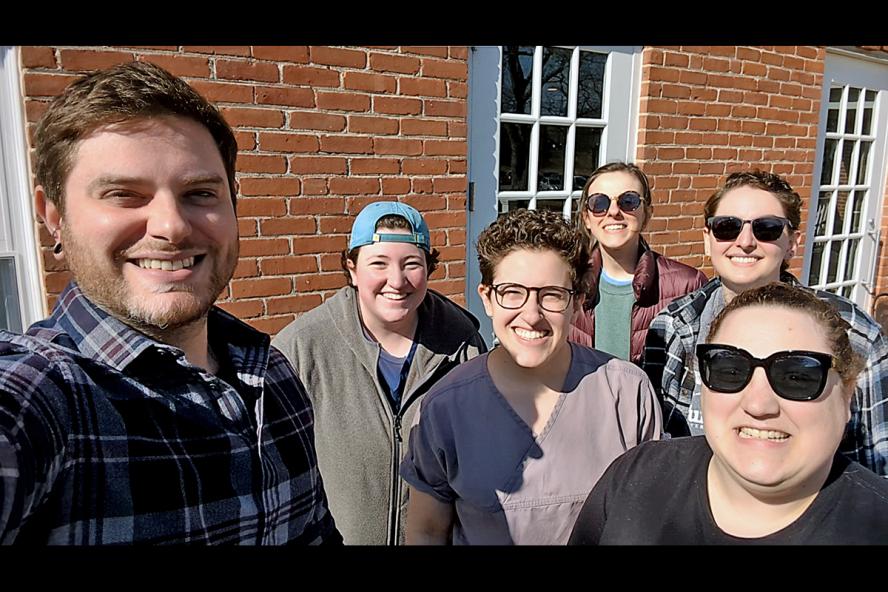-
About
- Leadership & Faculty
- News & Events
-
Admissions
-
Academics
- Graduate
- Advanced Clinical Training
- Continuing Education
- Academic Departments
- Academic Offices
- Simulation Experiences
-
Student Life
- Offices
-
Research
-
- Transformative Research
-
-
Hospitals & Clinics
- Emergency Care
- Hospital Services
-
Community Outreach
- Volunteer
Facilitating Diversity and Inclusion
Tufts Veterinary Council on Diversity paves the way at Cummings School of Veterinary Medicine

In 2014, Cummings School of Veterinary Medicine created the Tufts Veterinary Council on Diversity (TVCD) to serve as the umbrella organization for the student chapters of its national diversity-related organizations. Today, the Association of Asian Veterinary Medical Professionals (AAVMP), Latinx Veterinary Medical Association (LVMA), Pride Student Veterinary Medical Community (PrideSVMC), and Women’s Veterinary Leadership Development Initiative (WVLDI) comprise this group.
Student members of these groups may find it challenging to see themselves in a profession that lacks diversity. According to 2022 figures from the U.S. Bureau of Labor Statistics, 91% of the 83,000 veterinarians in the nation are white, followed by 4.3% Asian, 2.2% Black, and 0.5% Hispanic.
“The work of TVCD is primarily student-driven,” says Flo Tseng (she/her), associate dean for diversity, inclusion, equity, and climate. “My office collaborates often with the TVCD and its groups on social events, educational opportunities, and programming.”
Each group aims to empower and support its members, highlighted by a specific focus on either Asian (AAVMP), Latinx (LVMA), LGBTQIA+ (PrideSVMC) and women/all students (WVLDI).
Led by Faculty Co-chair Dr. Francisco Conrado (he/him) and newly elected Student Co-chair Patricia Giudice, V25 (she/they), TVCD includes representatives from each group and gathers monthly to address issues and guide diversity and inclusion initiatives focused on a goal to create an environment where all individuals are respected and feel like they belong. Brianna O’Malley, V24 (she/her), recently completed her tenure as TVCD student co-chair.
“We try to offer campus events to educate and promote DEI [diversity, equity, and inclusion] awareness and how that relates to veterinary medicine,” says O’Malley. “And working with our affinity groups we facilitate connections while creating either cultural or teaching opportunities.”
Membership in TVCD and its affiliate groups is open to all students. “The issues we address affect everyone,” says O’Malley, pointing out how helpful her involvement was to making connections.
“When I started here in 2020, everything was on Zoom … I met a lot of people and made friends through my involvement in both TVCD and LVMA, which was really helpful.”
Giudice adds, “Through TVCD I’ve gotten to know classmates, students from other class years, and faculty, which have all been wonderful to work with.”
Members of TVCD and its groups are supported through the Student Chapter of the American Veterinary Medical Association (SAVMA). In addition, four individual Diversity Scholarships are awarded annually to incoming first-year students from underrepresented groups. Endowed and awarded by the School, recipients are chosen from applicants by a scholarship selection committee, which includes TVCD’s faculty and student co-chairs. Efforts to increase the number of scholarships offered are ongoing.
Last fall, TVCD and the Office of DEIJ co-sponsored 10 students to attend RISE, the annual conference of the Multicultural Veterinary Medical Association (MCVMA). RISE [Resource. Include. Support. Elevate.] is a key component of MCVMA, which seeks to foster a community of veterinary professionals from diverse backgrounds and cultures to create a mutual support network for its members. The virtual conference featured all Black, Indigenous, and people of color (BIPOC) speakers.
In addition to facilitating events—such as an upcoming visit to campus by a woman and her seeing-eye dog to find out how they can be supported in a veterinary setting, and an informational meeting about antisemitism—TVCD has been a catalyst for change on campus.
In 2020, TVCD created and distributed pronoun pins for individuals to wear and display, if desired, as part of a larger campaign to educate the campus community and our visitors/clients about the importance of sharing pronouns and respecting the identity of each person.
The following year, pronouns were added to the name badges of clinical students.
Most recently, through TVCD and its disability justice liaison, Cummings School hired an accommodations administrator. “She is a veterinarian, so she is well aware of what is needed and can work with students and the administration to advocate for reasonable accommodations in clinical settings,” says Giudice.
O’Malley adds that TVCD is currently working on a photo shoot project as it seeks to create an accurate representation of Cummings School’s veterinary students while encouraging greater diversity in the profession. “We are one of the whitest professions and we need to represent the diversity of our clients, as well,” says O’Malley.
The future of TVCD may include additional groups to expand its reach. The organization aims to add an international student group and reinstate Veterinarians as One Inclusive Community for Empowerment (VOICE), which has been inactive since the pandemic, yet its values and goals have continued through TVCD and its affiliates.
VOICE emphasizes the importance of respect, sensitivity, and awareness among all individuals and communities, and provides a space for discourse through social, educational, and service events.
TVCD is also working to start on campus a student chapter of Not One More Vet, a mental health and suicide prevention group.
O’Malley shares, “The variety of groups allows individuals to focus on what they are interested in, while having the overall support of TVCD, as well. I hope that more students will join us so we can address important issues while we learn from each other.”